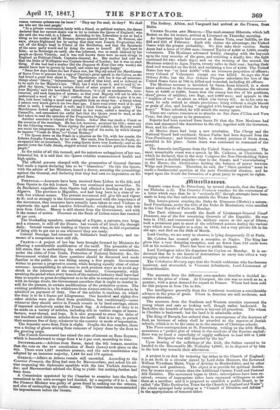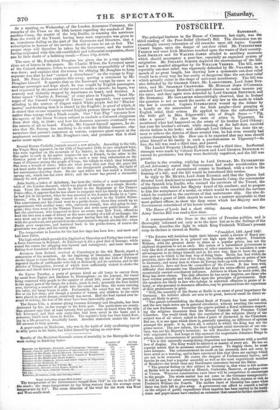cellaneous.
Reports come from St. Petersburg, by several channels, that the Empe- ror Nicholas is ill. The Courrier Francais vouches for the correctness of a letter which says that he is "seriously ill," though attempts have been made to keep the fact unknown outside the Winter Palace.
The letters-patent creating the Duke de Rianzares (Multriz) a natura- lized Frenchman, under the title of the Duke de Moutemoro, were enrolled in the Cour Royale of Paris on Monday.
The Paris obituary records the death of Lieutenant-General Count Doumerc, one of the few remaining Generals of the Republic. He was born in 1767, and commenced his military career at the ago of fifteen; took a prominent part in most of the celebrated actions during the various wars which were brought to a close in 1814; led a very private life in his old age; and died on the 30th of March.
Lord Cowley, we are sorry to observe, is lying dangerously ill at Paris-.
Mr. Cobden has created quite a sensation at Naples. The King has given him a very flattering reception, and no fewer than 119 cards were left at his residence. There has been no public banquet.
Lord Torrington takes his departure for Ceylon on Monday. It is un- derstood that he is the bearer of instructions to carry into effect a very sweeping reform of the island tariff.
The Caledonian Mercury says that the Scotch nobleman who has become insolvent, and absconded, is Viscount Arbuthnott, Lord-Lieutenant of Kincardineshire.
The accounts from the different corn-markets describe a decided in- crease in the price of wheat. At Liverpool, the rise was as much as 4s.. a quarter; with a great demand for export to France. Wheat had been sold for this purpose at from 78s. to 80s.
The intelligence generally from the Continent mentions a considerable- advance in the price of grain. Prices in America are still moderate, and supplies abundant. "
The accounts from the Southern and Western counties represent the young wheat and oats as looking well, though rather backward. In Berkshire the breadth of barley sown is beyond all precedent. The wheat in Cheshire is backward; but the land is in admirable order.
The King of Bavaria has ordered that, in consequence of the dearness of food, an increase of salary shall be awarded to the masters of Jewish schools, which is to be the same as to the masters of Christian schools.
The Times correspondent at St. Petersburg, writing on the 28th March, announces a "perfect glut of wheat in the markets of the Russian capital: there was on hand a superfluity of supply sufficient to load 900 or 1,000 vessels. Navigation was still impeded by the ice."
Upon hearing of the sufferings of the Irish, the Sultan caused to be handed to the Honourable Mr. Wellesley 1,000L, to be disposed of by hint in the best way towards their alleviation.
A project is on foot for restoring lay tithes to the Church of England: it is set forth in a circular signed by Lord John Manners the Reverend William Wyndham Malet, Vicar of Ardeley in Hertfordshire, and by other clergymen and gentlemen. The object is to provide for spiritual destitu- tion by means more certain than the Additional Curates Fund and Pastoral Aid Societies. The movement began in 1845; subscriptions have been re- ceived; owners of impropriate tithes have expressed willingness to cede them at a sacrifice; and it is proposed to establish a public Board, to be called "the Tithe Restitution Trust for the Church in England and Wales"; the whole episcopal body acting as a "Council of Direction and Advice" in the appropriation of restored tithes.
At a meeting, on Wednesday, of the London Assurance Company, the remarks of the Times on the 10th instant regarding the conduct of Ber- Eardino Camp, the master of the brig Emilio, in rescuing the survivors from the wreck of the Tweed, having been read, expression was given to an unanimous feeling on the part of the Governors and Directors, that a subscription in honour of his services should at once be set on foot. The proper steps will therefore be taken by the Governors; and the matter having originated with this old-established and influential corporation, there Can be little doubt of a befitting result—Times City Artick.
The case of Mr. Frederick Douglass has given rise to a very multifa- rious set of letters in the papers. Mr. Charles bl`Iver, the Liverpool agent of the Cunard steamers, writes to assume the whole responsibility of what was done; and explains that the reason for obliging Mr. Douglass to keep separate was that he had "created a disturbance" on the voyage to Eng- land. Mr. Peter Bolton explains this away, quoting a statement by Mr. Douglass himself. It appears that on the Eastward voyage he came as a steerage passenger and kept aloof; he was sought by English passengers, and requested by the master of the vessel to make a speech; he began, was coarsely and violently stopped by Americans on board, and desisted. A letter signed "Charles A. Burrup," of some place in Virginia, "head Ma- nager of the Cunard Company of Liners," next appeared; very coarsely alluding to the sources of disgust which White people feel for " Blacks- mores," and declaring that it is shared by the English; in proof of which, it is stated that on one occasion several English persons threw up their berths rather than voyage with a Black couple. One "Fair Play" recounts how the agents of the Great Western refused to exclude a Coloured clergyman from their ship, in 1840; and how his decorous manners eventually won the esteem of all on board. Finally, Mr. Cunard himself appears, he de- nies that Mr. Burrup has anything to do with the Halifax steamers, cha- racterizes that person's statement as untrue, expresses great regret at the unpleasant occurrence in Mr. Douglass's case, and promises that it shall never occur again.
Several Roman Catholic journals record a new miracle. According to the tale, the Virgin Mary appeared, on the 19th of September 1846, to two shepherd boys, who were together on the mountain of La Salette, in the diocese of Grenoble. She spoke to each in his native tongue—to one in French, to the other in the German patois of the frontier; giving to each a very long exhortation on the want of diligence among the people of Corps, the village to which they belonged. She wore a wreath of roses; when she went away they saw that the grass did not bend under the pressure of her feet; she disappeared gradually, the light of her countenance dazzling them. On one spot where her foot rested a fountain sprung out, which has not since dried; and the water has proved a successful remedy for sick persons.
John Smith, a baker of Aylesbury, has been the victim of a most transparent trick of the London sharpers, which was played off recently on a simple Scotch- man. From the statement made by Smith to the Magistrate at the Thames Police-office, it appears that he was about to emigrate with his family to America; he had 351. in his pocket, when he was accosted at the London Docks by a "gen- tleman," who, it turned out, wanted to send a nephew to the United States. The countryman and his friend went to a public-house; there they struck up an acquaintance with another man; who, curiously enough, was also going to emi- grate; they then went to the Thames Tunnel and some more public-houses. At last the gentleman, who happened to have an estate near New York, offered to lend the two men a sum of money on the mere security of a bill of exchange; the men went out to get the stamp, one sharper having first left a bundle of notes with the gentleman, and prevailed on the countryman to deposit also his 351.; when fimith grew suspicious, and hastened back to the public-house, of course the gentleman was gone, and his money also.
The temperature in London for the last few days has been low; and snow and hail have fallen.
The high wind which prevailed in England on Thursday and Friday last week was a fierce hurricane in Scotland. At Edinburgh it did a good deal of damage; while round the coasts the shipping was injured and endangered; and more than one fishing-boat foundered with the crews.
Accounts from Iceland, received at Copenhagen to the 8th March, report a commotion of the mountain. At the beginning of December, dense volumes of smoke began to issue from Heels; and from the 10th till the 15th of February repeated shocks of earthquake were felt at Reikiavik and its environs, and in the district of Thinggolden, several of which were sufficiently violent to shake the houses and throw down heavy pieces of furniture.
On Easter Tuesday, a party of persons hired an old barge to convey them by canal from Tipton and Darlston to Birmingham: on the journey, the vessel being crammed with people to the number of about 160, some of the passengers in the upper part of the barge, for a frolic, made it rock; presently the boat heeled over, throwing a number of people into the canal; and then, the water entering the cabin, the barge began to sink. Fortunately, the canal WRS not more than five or six feet deep; and though a number of women and children in the cabin were placed in great danger, everybody was saved. Had the boat turned over in- stead of sinking, the loss of life must have been lamentably great.
The Grans Uile, a steamer plying between Liverpool and Drogheda, has been destroyed by fire, on her voyage to the Irish port. The particulars are scanty. One account says that at least seventy-four persons were on board when the ship left Liverpool, and that only sixty-nine had been saved in the boats and a schooner, which took them to Dublin. The captain's body has been found float- ing in a life-preserver, dreadfully burnt. Another statement makes the loss of life amount to forty persons.
A paper-maker at Maidstone, who was in the habit of daily swallowing opium to allay pains in his limbs, has killed himself by taking an over-dose.
Results of the Registrar-General's return of mortality in the Metropolis for the week ending on Saturday last—
EymotIc (or Epidemic, Endemic, and Contagious) Diseases Dropsy, Cancer, and other diseases of uncertain or variable seat Diseases of the Brain, Spinal Marrow, Nerves, and Senses
Diseases of the Lungs, and of the other Organs of Respiration
Diseases of the Heart and Blood-vessels Diseases of the Stomach, Liver, and other Organs of Digestion Diseases of the Kidneys, Sr Childbirth, diseases of the Uterus, &c. Rheumatism, diseases of the Bones. Joints, Sc. Diseases of the Skin, Cellular Tissue, Sc.
Old Age
Violence, Privation, Cold, and Intemperance Total (Including unspecified causes) 1031 914
The temperature of the thermometer ranged from 73.0° in the sun to 29.0° in .the shade; the mean temperature by day being warmer than the average mean temperature by 2.1°. The mean direction of the wind for the week was West
and West-south-west. Number of Spring deaths. average. 174 . 166 99 158 275 29 70 8 174 ... 314 .... 47 87 13 13 16 4 54 10 8 57
25 28



























 Previous page
Previous page